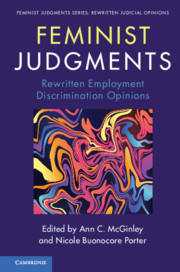Book contents
- Feminist Judgments: Rewritten Employment Discrimination Opinions
- Feminist Judgments Series Editors
- Advisory Panel for Feminist Judgments Series
- Feminist Judgments: Rewritten Employment Discrimination Opinions
- Copyright page
- Dedication
- Contents
- Advisory Panel for Feminist Judgments: Rewritten Employment Discrimination Opinions
- Notes on Contributors
- Preface
- Acknowledgments
- 1 Introduction
- 2 Supreme Court and Gender Narratives
- 3 Pregnancy Discrimination
- 4 Intersectional Approaches to Appearances
- 5 Harassment Because of Sex
- 6 Sexual Orientation and Gender Identity Discrimination as Sex Discrimination
- 7 Systemic Claims and Gender: Proving Disparate Treatment and Impact
- 8 Retaliation
- Index
1 - Introduction
Published online by Cambridge University Press: 01 October 2020
- Feminist Judgments: Rewritten Employment Discrimination Opinions
- Feminist Judgments Series Editors
- Advisory Panel for Feminist Judgments Series
- Feminist Judgments: Rewritten Employment Discrimination Opinions
- Copyright page
- Dedication
- Contents
- Advisory Panel for Feminist Judgments: Rewritten Employment Discrimination Opinions
- Notes on Contributors
- Preface
- Acknowledgments
- 1 Introduction
- 2 Supreme Court and Gender Narratives
- 3 Pregnancy Discrimination
- 4 Intersectional Approaches to Appearances
- 5 Harassment Because of Sex
- 6 Sexual Orientation and Gender Identity Discrimination as Sex Discrimination
- 7 Systemic Claims and Gender: Proving Disparate Treatment and Impact
- 8 Retaliation
- Index
Summary
Chapter 1 demonstrates that employment discrimination law is not neutral or objective, favoring employers’ interests over those of employees as victims. It introduces fifteen US federal cases, rewritten using feminist perspectives and techniques, as well as only information available at the time of the original opinions. Commentaries accompany each opinion, explaining differences from the original and differences the rewritten opinion would have made to employment discrimination law. The chapter summarizes these cases and argues that the opinions, as rewritten: better narrate victims’ stories; improve the law around proving discrimination; diminish appearance regulation and encourage diversity in workplaces; eliminate the “double bind”; recognize LGBTQ+ rights in the workplace; prevent sex- and gender-based harassment; offer insight into intersectional approaches; and recognize the implicit bias and stereotypes that cause discrimination. This chapter also briefly examines the issues in employment discrimination law that this book does not discuss in depth, such as age and disability discrimination, predispute arbitration clauses, and discrimination by religious employers.
Keywords
Information
- Type
- Chapter
- Information
- Feminist JudgmentsRewritten Employment Discrimination Opinions, pp. 1 - 29Publisher: Cambridge University PressPrint publication year: 2020
